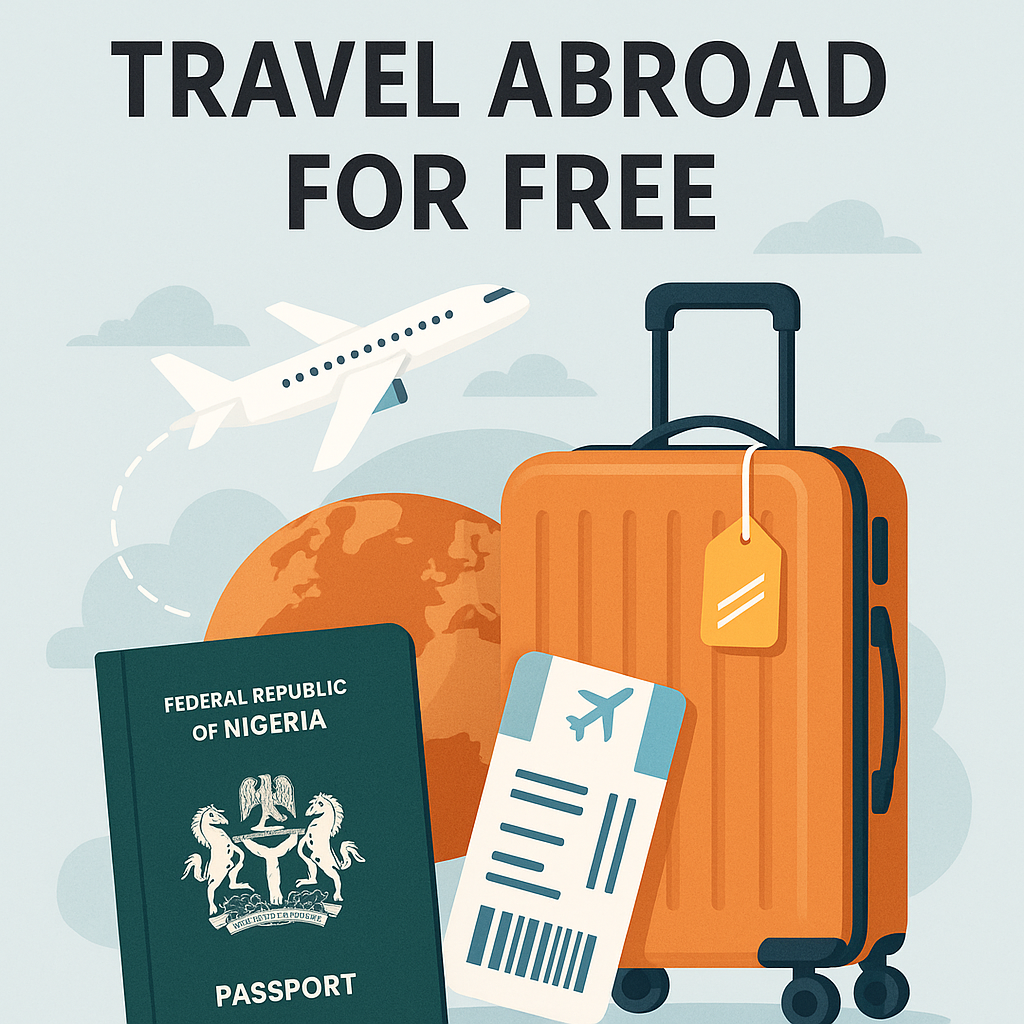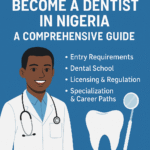Travelling abroad for free may sound like a dream, especially for many Nigerians facing financial constraints—but it’s not impossible. With the right strategies, you can access opportunities that cover your flights, accommodation, training or study costs, and living expenses. This article explores realistic pathways geared toward Nigerians to travel abroad at little or no cost, while also ensuring you remain compliant with platforms like Google AdSense (i.e., no promotion of prohibited content, no misleading claims) and maintain an informative, genuine tone.
1. Understand What “Free Travel Abroad” Really Means
When we say “free travel abroad,” we’re usually referring to opportunities where someone else covers most of your costs (or offsets them significantly). These aren’t simply holiday‑free trips, but strategic programmes such as:
- Fully funded study abroad scholarships (covering tuition, living, flights)
- Fellowships, grants or travel awards for conferences/training
- Volunteer or cultural exchange programmes that provide accommodation and meals
- Sometimes work‑exchange arrangements where you travel, live abroad and contribute time/skills
These require effort, applications, eligibility criteria—not “book a free ticket and go.”
For example: one guide says that it’s “easier to travel abroad for free through various scholarship schemes, workshops, conferences, be it academic or professional.” After School Africa
So the key is: research + qualify + apply.
2. Pathway A: Fully‑Funded Study Abroad Programmes
If you’re a student (undergraduate or postgraduate) or keen to study abroad, this pathway is one of the most reliable.
What’s available for Nigerians
- There are thousands of fully‑funded scholarships available to Nigerian students from universities and governments around the world. Scholarship Roar+2Mastersportal+2
- For instance: the German Academic Exchange Service (DAAD) offers support for Nigerian graduates/doctoral candidates, covering living allowance + travel + tuition. Scholarship Roar+1
- Universities such as University of Manchester offer merit‑based scholarships for students from Nigeria up to £18,000 or more. The University of Manchester
What to do: step‑by‑step
- Research programmes: Identify universities/countries you’re interested in. Use scholarship databases (for example, IEFA) to scan for international scholarships. IEFA+1
- Check eligibility: Most scholarships require: Nigerian citizenship, high academic grades, proof of English proficiency (IELTS/TOEFL), letters of recommendation, strong statement of purpose. aecc Nigeria
- Prepare documents ahead: Academic transcripts, certificates, references, language test results, personal statement.
- Apply early: Deadlines are strict. Many scholarships for 2025/26 open well ahead.
- Follow up on visa/travel arrangements: Once awarded, ensure you understand the travel component (some cover airfare, others don’t). For example, some scholarships mention “travel allowance” explicitly. Scholarship Region
Tips for better success
- Focus on strengthening your profile: involve extra‑curriculars, leadership roles, community service.
- Choose fields with demand or unique angles (STEM, sustainability, etc.).
- Apply to multiple scholarships—don’t rely on one.
- Be honest in your application and meet all stated criteria.
3. Pathway B: Fellowships, Grants, Travel Awards & Conferences
If studying full‑time abroad isn’t your (current) goal, you can still travel abroad for free (or very low cost) via fellowships/grants/conferences.
How this works
- Some institutions offer travel grants to attend conferences, workshops or training abroad. Nigerians are eligible. WeMakeScholars
- These opportunities may cover airfare + accommodation + meals for a defined short trip abroad.
- A well‑targeted conference or fellowship can expose you internationally and cost you very little.
Steps to pursue this
- Identify relevant fields: What are your interests (research, business, arts)? Look for conferences or workshops in those areas.
- Search for travel grants: Many platforms list “travel grants” for Nigerian students/professionals.
- Prepare a compelling mini‑application: Why you should go, what’s the benefit, how you’ll contribute.
- Attend and network: Once selected, make the most of the trip by networking, learning, and documenting the experience (which can boost your future applications).
Why this is valuable
- Great stepping‑stone if you’re not ready for full‑time study abroad.
- Adds international experience to your CV.
- Less risky/more manageable than relocating abroad.
4. Pathway C: Volunteer, Cultural Exchange & Work‑Exchange Programmes
Another legitimate way to travel abroad with minimal cost is via volunteer programmes or exchange initiatives.
Some realities for Nigerians
- Platforms like Worldpackers allow Nigerians to volunteer abroad in host countries in exchange for free accommodation/food or low cost arrangement. Ijeawele
- Note: While accommodation/food may be free, you still often cover flight/visa costs or other local expenses—so “completely free” is less common here than in fully‑funded scholarships.
- Important: Always verify legitimacy of the host organisation, visa/work‑exchange legality, and local cost obligations.
How to proceed
- Define interests and skills: Could be teaching, hospitality, environment, community service.
- Search trusted volunteer exchange platforms: Look for ones with reviews, safeguards.
- Budget for remaining costs: Flights, visa, possibly insurance—plan how you’ll cover these or apply for support.
- Prepare documentation: CV, motivations, references, any required certificates/health checks.
- Ensure compliance: Make sure the country’s visa requirements allow volunteering or exchange—they differ widely.
Pros and cons
- Pros: immersive cultural experience; lower cost; meaningful work; networking.
- Cons: may still involve some cost; sometimes limited by visa restrictions; may not be fully “travel for free”.
5. Bonus Tips & Practical Advice
A. Leverage Nigerian‑specific resources
- Keep an eye on Nigerian‑based websites or agencies that compile scholarship/travel opportunities for Nigerians. ScholarshipAir+1
- Join local or online communities of Nigerians who have already travelled abroad—learning from their journey improves your odds.
B. Be aware of visa/travel policy changes
- For example, recent visa restrictions by the United States Department of State on Nigerian applicants may affect travel abroad. Reuters
- Always check destination country’s visa rules, cost of living, language requirements, health/insurance norms.
C. Maintain a “travel‑friendly” mindset
- Prepare strong personal branding: good academic/work record, clear goals, international outlook.
- Cultivate language skills (English fluency is often required).
- Document your achievements, community/leadership involvement.
- Save or plan for “small costs” (e.g., visa fees, travel to interview centre, test fees) even if many costs are covered.
D. Always check the fine print
- Some “free” offers exclude airfare or only partially cover travel.
- Some volunteer programmes may require you to pay quite a bit up‑front.
- Ensure any promised “free” coverage is clear and in writing.
E. Use the “3–5 application” rule
- Apply to multiple programmes (say 3–5) simultaneously rather than waiting for one.
- This increases your chances.
6. Example Scenarios: How It Could Work
- Scenario 1: You apply for a fully‑funded master’s scholarship in Germany, get awarded with tuition, monthly stipend, accommodation and airfare included. You relocate abroad and study for 2 years with minimal personal cost.
- Scenario 2: You apply for a travel grant to attend an international conference in a foreign country, get your airfare and accommodation covered, stay for 10 days, network, take back new insights.
- Scenario 3: You volunteer via a trusted work‑exchange programme abroad for 4 weeks, your accommodation and meals are covered, you only pay for visa/flight, you live and work in a foreign country immersing in culture.
7. Final Word
Travelling abroad for free (or near‑free) as a Nigerian is entirely possible—but it demands strategy, effort and preparedness. The key is to approach it not as “free holiday” but as purpose‑driven opportunity (study, conference, volunteering) where someone else covers most major costs because you add value (academic excellence, leadership, skills, participation).
By leveraging the pathways above—scholarships, fellowships, volunteer exchanges—and by preparing your application rigorously, you can turn the dream of travelling abroad for free into a reality.


